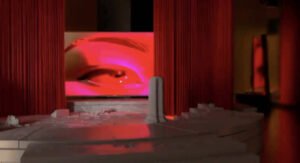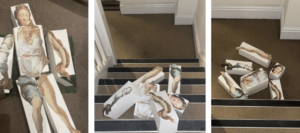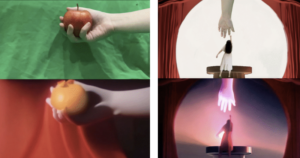Historical Research
In Greece, Since the Homer era, (12th century BC to 8th century BC) Western gender relationships have gradually shifted from partnerships to unequal relationships that subordinate women to men. This phenomenon became increasingly evident in the ancient era (8th century BC to 6th century BC) and reached its peak in the Classical era(6th century BC to 4th century BC).

With the improvement of the city-state system, the opposition pattern between the public sphere of the city-state with male citizens as the main body and the private sphere of the family with female as the main body has gradually formed.
The goddesses in Greek mythology are often portrayed as objects, despite their varying characteristics such as intelligence, beauty, pathos, and jealousy. This portrayal is a reflection of the patriarchal gaze that existed in ancient Greece. Through literature and stories, the goddesses have been deconstructed to reveal this phenomenon.
To visualize this abstract term, five oil paintings of goddess characters from Greek mythology, namely Hera, Athena, Venus, and Helen, were chosen. Their body parts in the paintings were then separated to construct a new image.
This process of deconstruction is important to understand the development of ancient Greek mythology, which is a reflection of reality in a specific social environment at that time. Therefore, it is essential to conduct historical background research to gain a deeper understanding of the subject matter.

“Bravel New World”
The issue of ‘male gaze’ and ‘female competition’ has drawn considerable attention in recent years. People are increasingly aware that this is related to the deep-rooted gender ideology. This projrct aims to investigate the differences of changes in power and status between gods and goddesses in ancient Greek mythology and the refraction and subtle influence on contem- porary gender issues.
Myths are a product of the collective unconscious of humanity. As one of the oldest systematic philosophical myths in the world, ancient Greek mythology has continuously provided ideological supplies to art, culture, and even social forms in the Western world. It sprouted from Homer’s epic around the 12th century BC and was constantly supplemented and perfected until the third century BC.
The justice, courage and spirit of resistance it conveys are worthy of praise, but at the same time, the objectivity (stereotype) and limitations of female characters in the ancient Greek mythological worldview are also worth pointing out and further researching. As one of the gender roles in Greek mythology, the goddess is constructed into a complex and brief appearance. The complexity lies in the fact that goddesses also have different personalities and missions; the simplicity lies in the fact that the trends and endings of their existence value mostly serve to prove the power, vigor and particularity of male gods.
Also, this project is connected to contemporary social issue of gender equality by deconstructing ancient the mythology, and explores how the changing status of female is reflected in goddesses.
Aim
This project will dialectically discuss the limitations of gender equality in ancient Greek mythology through the analysis of gender roles and the deconstruction of the portraits of god- desses in ancient Greek mythology, and further reflect on the reasons for its emergence.
The results in this project are expected shed light on dialecti- cal cognition of ancient Greek mythology and provide insights for analyzing the gender dilemma faced by women, anti the objectification of female, reflecting the plight of contempo- rary women by focusing on the plight of women in Greek mythology.
Process
‘Runaway gen’ supports using pictures as reference and using videos to gener- ate videos; ‘Runaway gen2’ supports using language as description and using pictures to generate videos. These two tools can greatly emphasize my personal style and enhance the stability of my output.
The principal insight garnered from the shortcomings of the preced- ing experiment underscores the imperative of not excessively depending on artificial intelligence software. Rather, it emphasizes the utilization of such technology as an instrumental adjunct to the realization of the conceptual frameworks and projects. In this partic- ular experiment, an eclectic array of tools was employed.



Outcome
The spirit of integrity, bravery and compassion conveyed by Greek mythology is an important part of the human civilization history.
But at the same time, the female characters in Greek mythology also faced the circumstance of being objectified, and they became a part of the discipline of the patriarchal system.
The Concept of “Brave New World” is a deconstruction of traditional-male-perspective-Greek mythology, expresses the spirit of resistance and criticism by constructing a new world view and reinterpreting or rewriting the storyline in mythology.